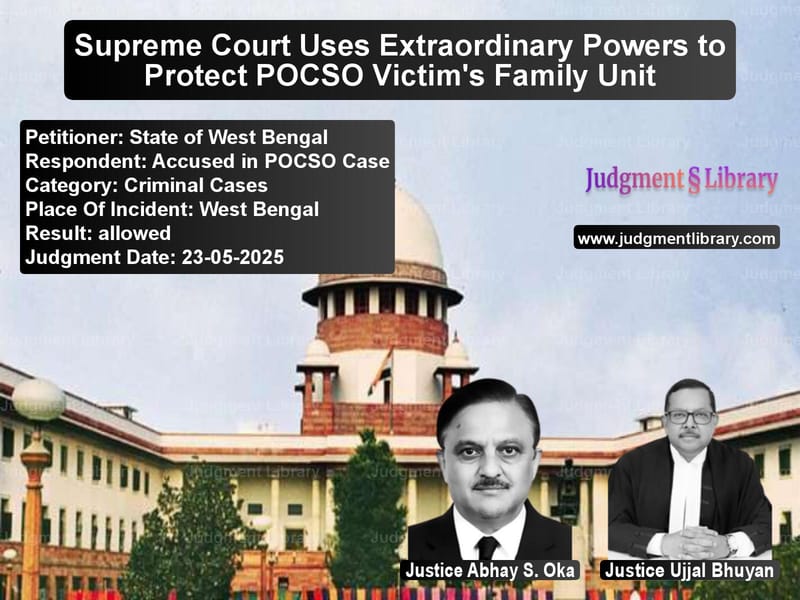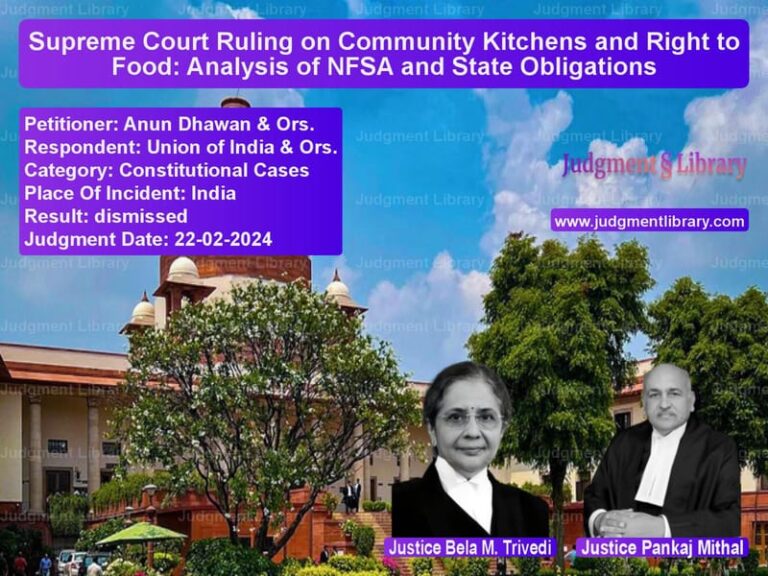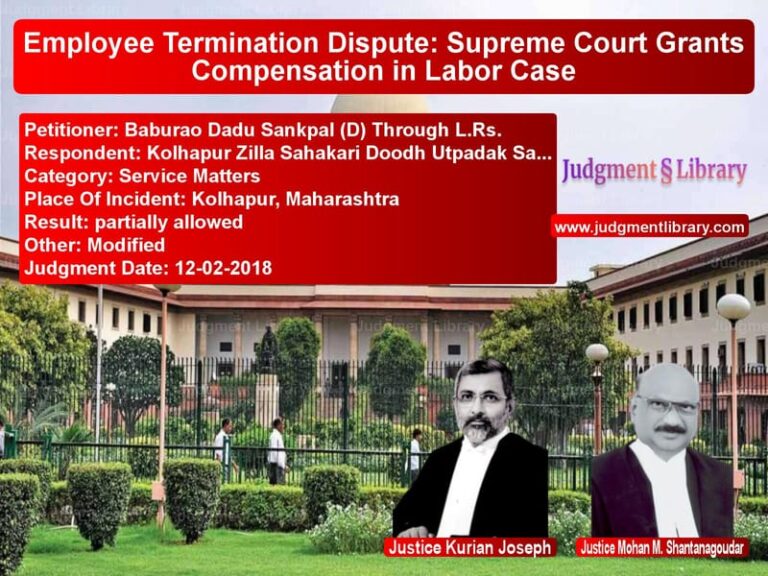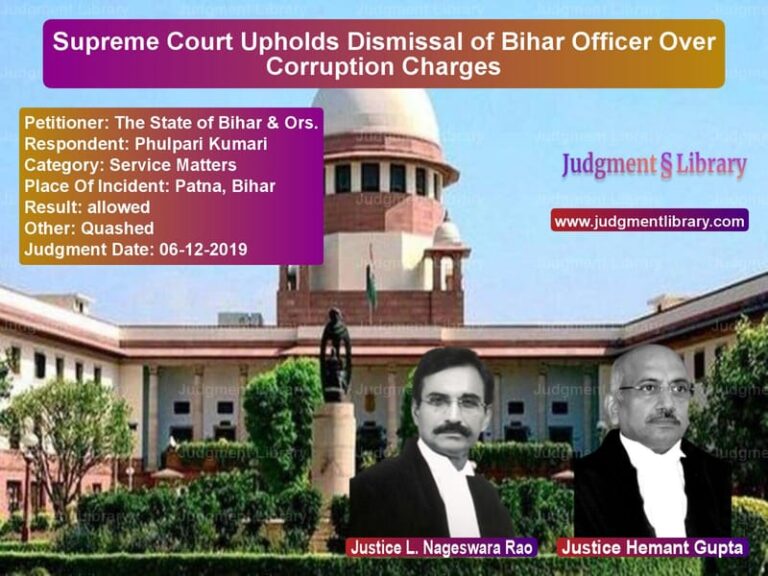Supreme Court Uses Extraordinary Powers to Protect POCSO Victim’s Family Unit
In a landmark judgment that balances legal principles with human compassion, the Supreme Court of India has delivered a groundbreaking decision in a complex case involving a POCSO Act conviction, choosing to protect an established family unit rather than impose a mandatory prison sentence. The case, which originated from West Bengal, involved a 14-year-old girl who entered into a relationship with a 25-year-old man, resulting in the birth of a child and subsequent legal proceedings under the Protection of Children from Sexual Offences Act.
The legal journey began when the victim’s mother filed an FIR in May 2018 after her daughter left home. The accused was convicted under Section 6 of the POCSO Act and relevant sections of the Indian Penal Code by the Special POCSO Court, which sentenced him to twenty years of rigorous imprisonment. However, the Calcutta High Court later set aside this conviction, prompting the Supreme Court to take suo motu cognizance of the matter.
The Supreme Court, in its earlier judgment dated August 20, 2024, had restored the conviction while postponing the sentencing to examine the unique circumstances of the case. The Court noted the troubling reality that “the victim’s parents completely abandoned her, at least from the year 2019” and that “no opportunity was made available to a girl of fourteen or fifteen years of age to make an informed choice to decide whether to stay with the accused.”
Read also: https://judgmentlibrary.com/supreme-court-corrects-typographical-error-in-criminal-case-judgment/
The Court constituted an expert committee to assess the situation, and their reports revealed a heartbreaking story of systemic failure and personal resilience. The victim, now a young woman, had fought tirelessly for her partner’s release, spending over two lakh rupees—mostly borrowed—on legal expenses while being exploited by lawyers and touts. The committee’s final report made a crucial observation: “In this case, the law saw it as a crime, the victim did not. Hence, the legal crime did not cause any trauma on this particular victim. It was the consequences thereafter – the police personnel, the legal system, the battle to save her husband and do the best for her daughter while having a financial burden, which is taking its toll on her.”
The Court heard extensive submissions from the amicus curiae, who presented three alternatives for sentencing. They argued that the Court could exercise its powers under Article 142 of the Constitution to remit, reduce or suspend the sentence, considering the evolving welfare interests of both the victim and her child. The learned amici emphasized that “while the POCSO Act serves an essential purpose in protecting minors from sexual exploitation, its rigid application in cases of adolescent relationships can lead to outcomes that may not align with the best interests of the prosecutrix and her dependents.”
After carefully considering the committee reports and interacting with the victim, the Court reached a profound conclusion. Justice Abhay S. Oka, writing for the bench, observed: “In law, we have no option but to sentence the accused and send him to jail for undergoing the minimum punishment prescribed by the Statute. However, in this case, the society, the family of the victim and the legal system have done enough injustice to the victim. She has been subjected to enough trauma and agony. We do not want to add to the injustice done to the victim by sending her husband to jail.”
The Court made it clear that this was not an easy decision, noting that “We as Judges, cannot shut our eyes to these harsh realities. Now, at this stage, in order to do real justice to the victim, the only option left before us is to ensure that the accused is not separated from the victim.”
In exercising its extraordinary jurisdiction under Article 142 of the Constitution, the Court held that “though the accused stands convicted, he will not undergo sentence for the reasons stated earlier.” The Court was careful to clarify that “This case is not going to be a precedent and should not be a precedent. This case is an illustration of the complete failure of our society and our legal system.”
The judgment also addressed the broader systemic failures, noting that “There are various decisions of this Court holding that the High Court can exercise jurisdiction under Section 482 of the Cr.PC to quash a prosecution on the grounds of settlement or by consent… however, in view of the settled position of law, in the facts of the case, even if the accused and the victim (who has now attained majority) were to come out with a settlement, the High Court could not have quashed the prosecution.”
The Court issued comprehensive rehabilitation directions, ordering the State of West Bengal to provide better shelter, bear the entire educational expenses of both the victim and her child until graduation, and help settle the debts incurred during the legal battle. The State was directed to “act as a true guardian of the victim and her child” and file regular compliance reports.
Recognizing the need for broader reform, the Court also impleaded the Union of India through the Ministry of Women and Child Development and directed the formation of a committee to implement the suggestions made by the amicus curiae regarding adolescent wellbeing and comprehensive sexuality education.
Read also: https://judgmentlibrary.com/cbi-cotton-msp-fraud-case-supreme-court-sets-aside-discharge-of-accused/
The Court’s reasoning reflected deep concern about the victim’s current situation: “After having read the reports and having interacted with the Committee as well as the victim, we are of the view that if we send the accused to jail, the worst sufferer will be the victim herself. As compared to the situation in 2018, she is better placed today. Now she is comfortable with her small family.”
This judgment represents a significant moment in Indian jurisprudence, where the Supreme Court balanced strict statutory mandates with the principles of proportionality and complete justice. The Court acknowledged that “Ultimately, this Court is bestowed with extraordinary jurisdiction under Article 142 for the sole object of ensuring that the highest Court of the land is in a position to do substantial justice in its truest sense. In the context of this situation, sadly, true justice lies in not sentencing the accused to undergo imprisonment.”
The case serves as a powerful reminder that while laws are essential for protecting children, their application must consider the unique circumstances of each case, especially when rigid enforcement might cause more harm than good to the very persons the laws were designed to protect.
Petitioner Name: State of West Bengal.Respondent Name: Accused in POCSO Case.Judgment By: Justice Abhay S. Oka, Justice Ujjal Bhuyan.Place Of Incident: West Bengal.Judgment Date: 23-05-2025.Result: allowed.
Don’t miss out on the full details! Download the complete judgment in PDF format below and gain valuable insights instantly!
Download Judgment: state-of-west-bengal-vs-accused-in-pocso-cas-supreme-court-of-india-judgment-dated-23-05-2025.pdf
Directly Download Judgment: Directly download this Judgment
See all petitions in Juvenile Justice
See all petitions in Bail and Anticipatory Bail
See all petitions in SC/ST Act Case
See all petitions in Judgment by Abhay S. Oka
See all petitions in Judgment by Ujjal Bhuyan
See all petitions in allowed
See all petitions in supreme court of India judgments May 2025
See all petitions in 2025 judgments
See all posts in Criminal Cases Category
See all allowed petitions in Criminal Cases Category
See all Dismissed petitions in Criminal Cases Category
See all partially allowed petitions in Criminal Cases Category







